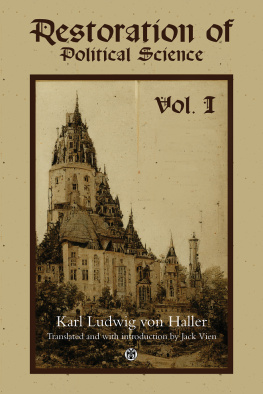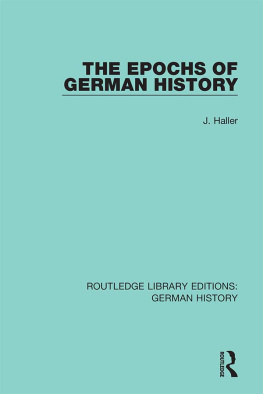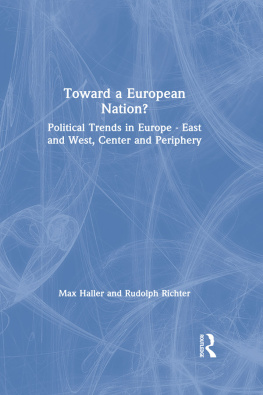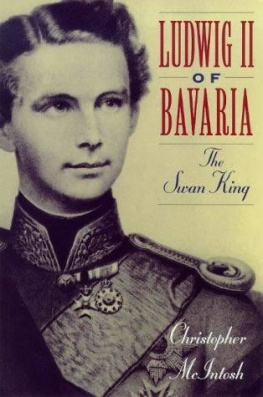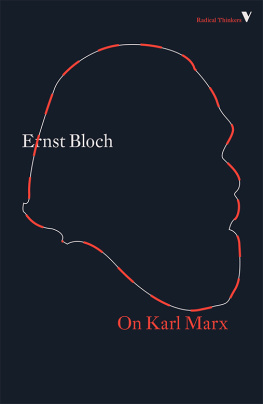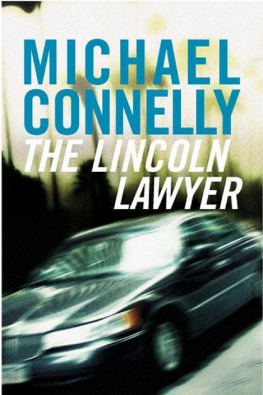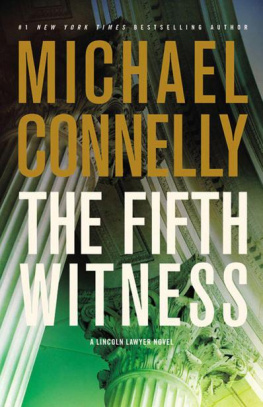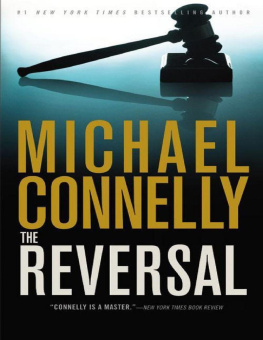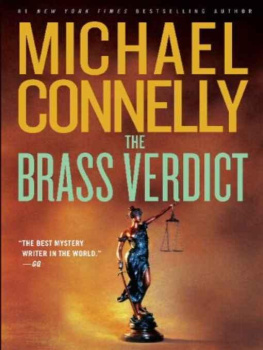Karl Ludwig von Haller - Restoration of Political Science
Here you can read online Karl Ludwig von Haller - Restoration of Political Science full text of the book (entire story) in english for free. Download pdf and epub, get meaning, cover and reviews about this ebook. year: 2023, publisher: Imperium Press, genre: Science / Politics. Description of the work, (preface) as well as reviews are available. Best literature library LitArk.com created for fans of good reading and offers a wide selection of genres:
Romance novel
Science fiction
Adventure
Detective
Science
History
Home and family
Prose
Art
Politics
Computer
Non-fiction
Religion
Business
Children
Humor
Choose a favorite category and find really read worthwhile books. Enjoy immersion in the world of imagination, feel the emotions of the characters or learn something new for yourself, make an fascinating discovery.
- Book:Restoration of Political Science
- Author:
- Publisher:Imperium Press
- Genre:
- Year:2023
- Rating:3 / 5
- Favourites:Add to favourites
- Your mark:
- 60
- 1
- 2
- 3
- 4
- 5
Restoration of Political Science: summary, description and annotation
We offer to read an annotation, description, summary or preface (depends on what the author of the book "Restoration of Political Science" wrote himself). If you haven't found the necessary information about the book — write in the comments, we will try to find it.
Restoration of Political Science — read online for free the complete book (whole text) full work
Below is the text of the book, divided by pages. System saving the place of the last page read, allows you to conveniently read the book "Restoration of Political Science" online for free, without having to search again every time where you left off. Put a bookmark, and you can go to the page where you finished reading at any time.
Font size:
Interval:
Bookmark:
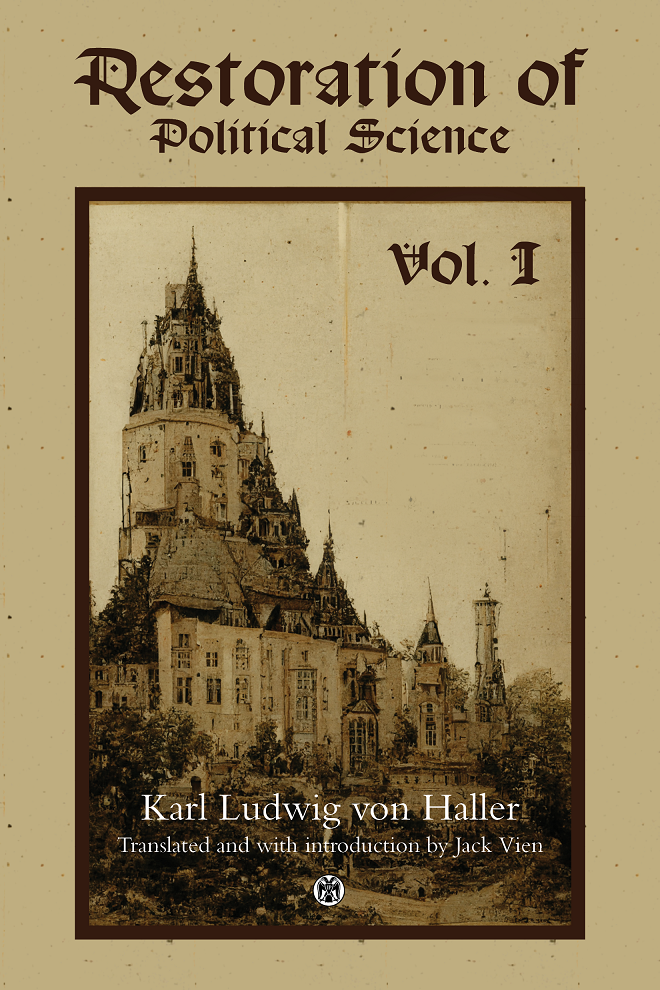

Imperium Press was founded in 2018 to supply students and laymen with works in the history of rightist thought. If these works are available at all in modern editions, they are rarely ever available in editions that place them where they belong: outside the liberal weltanschauung. Imperium Press mission is to provide right thinkers with authoritative editions of the works that make up their own canon. These editions include introductions and commentary which place these canonical works squarely within the context of tradition, reaction, and counter-Enlightenment thoughtthe only context in which they can be properly understood.
Karl Ludwig von Haller was born in 1768 into a prestigious family in Bern, Switzerland; his grandfather was Albrecht von Haller, often called the father of modern physiology. Largely self-educated, he was originally a supporter of the French Revolution but soon swore off liberalism and became a reactionary. His influence is almost nil in the English-speaking world, but he has long been recognized as a crucial Counter-Revolution figure on the European Continent, with his scathing criticisms of the imaginary social contract and state of nature, as well as his critique of Roman law.
Restoration of
Political
Science
Karl Ludwig
von Haller
Translated and with introduction by
Jack Vien

Perth
Imperium Press
2023
Published by Imperium Press
www.imperiumpress.org
Translation and introduction Jack Vien, 2023
The moral rights of the translator have been asserted
Used under license to Imperium Press
All rights are reserved. No part of this publication may be
reproduced, stored in a retrieval system, or transmitted in any
form or by any means, electronic, mechanical, photocopying,
recording, or otherwise, without prior permission of Imperium
Press. Enquiries concerning reproduction outside the scope of
the above should be directed to Imperium Press.
First Edition

A catalogue record for this
book is available from the
National Library of Australia
ISBN 978-1-922602-76-3 Paperback
ISBN 978-1-922602-77-0 Hardcover
ISBN 978-1-922602-78-7 E-book
Imperium Press has no responsibility for the persistence or
accuracy of URLs for external or third-party Internet websites
referred to in this publication and does not guarantee that
any content on such websites is, or will remain, accurate or
appropriate.
TABLE OF CONTENTS.
Restoration of Political Science
Proofs furnished by the history of all times and places.
I. General or philosophical knowledge of States , what can be called their natural history . (Doctrine of the origin, distinctive features, variety, natural rise and decadence of States).
II. Social Justice or Social law , improperly known as public. (Application of the natural law of justice, to those relations given in nature).
III. Statecraft . (Rules of prudence or the necessary and licit means of preserving and strengthening States).
IV. Impossibility of separating these three parts of one and the same science.
I. Hypothesis of a primordial state of nature, of a social contract, of the delegation of power.
II. Basic and still-incomplete elements of this theory.
I. Inversion of all relations. The people is the true sovereign, and princes are but its servants.
II. The general will is the sole law. Everything belongs to the nation.
III. The constitution of the State is a machine, and can be changed at will.
Illegitimacy of all existing States, without exception. Necessity of overthrowing them and forming them anew. Representation of the people, by means of which it can exercise its sovereignty itself. Division of powers; legislation attributed to the people. Exaltation of constitutions analogous to those of republics, as eminently suited to thwart future usurpation. All heritability and alienation of sovereign power condemned as absolutely illegitimate.
Grotius, Hobbes, Sidney, Locke, Pufendorf, Boehmer, Montesquieu, Rousseau, Sieyes, Kant, etc., etc.
I. Importance of this history. How it differs from purely historical knowledge.
II. State of the science before Hobbes and Grotius.
III. Causes that gave rise to false principles of public law.
1. Roman law, or language borrowed from Roman law, and applied to completely different things.
2. Ideas owing to the Reformation. Error committed in confounding the nature of the Church, chiefly the Protestant Church, with other social relations. English Puritans.
3. Quarrels between the Parliament of England and the royal House of Stuart. Hobbes, Needham, Sidney, Milton, Locke, etc.
4. Vacillating state of the science in Germany at the beginning of the eighteenth century.
IV. Further developments, and systematic propagation of false principles.
1. French philosophists and Encyclopedists.
2. German innovators and Illuminati.
V. Causes of the general delusion.
A. Among scholars and the middle classes.
B. Among the nobility.
C. Finally, even among sovereign princes.
VI. Pernicious influence of these principles in several countries in Europe, even before the French Revolution.
1. In Portugal. Pombal, etc.
2. In Russia. Catherine II; National Assembly and Order of 1768.
3. In Prussia. Frederick II. Prussian Code.
4. In Austria. So-called reforms, of Emperor Joseph II.
5. In Tuscany. Leopolds Innovations.
6. In the rest of Italy, and central Germany.
7. In France itself. Louis XVI, Turgot, Necker, etc.
VII. Results. Universal reign of false principles of public law. Transformation of political language. Predictions of the coming overthrow of Church and States.
I. Causes of the convening of the Estates-General in 1789.
II. Influence of the new doctrines on the composition of these Estates and even on the method of election.
III. Triumph of these doctrines within the Assembly. Its systematic fight against all spiritual and temporal authority.
IV. First constitution based on the pseudo-philosophical principles.
1. Violent abolition of the first constitution and the monarchy. Absolute sovereignty of the people. National convention entirely made up of philosophists. Republic founded on liberty and equality.
II. Triple-war, external, internal, and civil between republicans themselves. Bloody tyranny of factions that quickly set upon one another.
III. Fourth supposed constitution introduced by force. Its effects and reversal in course.
IV. It was unworkable and soon overturned. Successive coups dEtat. Struggle between parties contending for supreme power.
V. Success in the war abroad, favoured by the near-universal reign of revolutionary principles. Propagation of the Revolution. Its apparent triumph in all of Europe.
I. In essence it never succeeded, and the revolutionary system was never actually realized, since it was contrary to nature.
II. How war by necessity had to bring about the end of this system.
III. Prompt formation of a new empire, founded on personal power, and individual agreements.
IV. Results. Servitude infinitely more extensive and severe than the old. Remarks on the restoration.
Font size:
Interval:
Bookmark:
Similar books «Restoration of Political Science»
Look at similar books to Restoration of Political Science. We have selected literature similar in name and meaning in the hope of providing readers with more options to find new, interesting, not yet read works.
Discussion, reviews of the book Restoration of Political Science and just readers' own opinions. Leave your comments, write what you think about the work, its meaning or the main characters. Specify what exactly you liked and what you didn't like, and why you think so.

